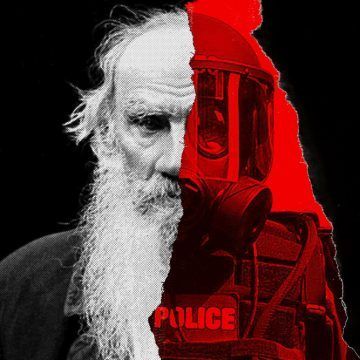Jennifer Wilson in The New York Times:
 Tolstoy was drawn to seekers, to characters perpetually in the throes of spiritual crisis; George Orwell described them as figures “struggling to make their souls.” Indeed, Tolstoy saw emergencies, personal and social, as necessary ruptures that could spark a deeper questioning of society and the beliefs that supported it. Of his own spiritual reawakening, captured in his memoir “A Confession” (1882), he described feeling as though the ground beneath him had collapsed. It is no wonder, then, that readers are finding new urgency in his work at a time when the racial and economic inequities revealed by Covid-19 and police killings have inspired unprecedented numbers of people to begin questioning some of this country’s foundational myths. With calls to defund the police, many are asking, for the first time in their lives, not just how our institutions function but whether they should exist at all.
Tolstoy was drawn to seekers, to characters perpetually in the throes of spiritual crisis; George Orwell described them as figures “struggling to make their souls.” Indeed, Tolstoy saw emergencies, personal and social, as necessary ruptures that could spark a deeper questioning of society and the beliefs that supported it. Of his own spiritual reawakening, captured in his memoir “A Confession” (1882), he described feeling as though the ground beneath him had collapsed. It is no wonder, then, that readers are finding new urgency in his work at a time when the racial and economic inequities revealed by Covid-19 and police killings have inspired unprecedented numbers of people to begin questioning some of this country’s foundational myths. With calls to defund the police, many are asking, for the first time in their lives, not just how our institutions function but whether they should exist at all.
One of Tolstoy’s seekers who found himself on such a path is Ivan Vassilievich, the protagonist of his 1903 short story “After the Ball.” Ivan is a young society man who falls in love with the daughter of a colonel, and plans to enlist himself until a fateful early-morning walk. He has spent the previous night at a ball in town, dancing with the daughter, a “bony” young beauty named Varenka: “Though I was a fancier of champagne,” he reflects, “I did not drink, because, without any wine, I was drunk with love.” However, Ivan falls as much in love with Varenka’s father, a kind and gentle-seeming man, who, Ivan tenderly notes, wears plain boots to the ball because he prefers to spend all his extra money on his daughter. After the ball, Ivan returns home, but is still so full of enchantment that he cannot sleep.
Instead, he takes a walk across the snowy streets in the direction of Varenka’s home, but when he arrives, he encounters a confounding scene: “Soldiers in black uniforms were standing in two rows facing each other, holding their guns at their sides and not moving. Behind them stood the drummer and fifer, ceaselessly repeating the same unpleasant, shrill melody.” It is a military gantlet and the accused, a young Tatar officer (Tatars were an ethnic minority in Russia), is being punished for desertion. Ivan looks on, frozen, as the young man’s body becomes bloodied: “His whole body jerking, his feet splashing through the melting snow, the punished man moved toward me under a shower of blows.” Ivan sees that the colonel leading the procession is none other than Varenka’s father, the man he thought of only hours before as loving and warm.
More here.
